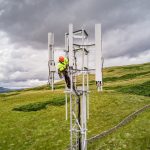BT Sign £264m Superfast Broadband Upgrade Contract for Scotland UK
The government of Scotland has today signed a state aid supported £264 million deal with BT that will make “fibre broadband” (FTTC/P) services available to 85% of local homes and businesses by the end of 2015 and around 95% by the end of 2017. As before we don’t know what proportion of those will get “superfast” (25Mbps+) speeds.
The contract, which was signed today at the BT exchange building in Pitt Street (Glasgow) and includes the £146.4 million Highlands and Islands deal from March 2013 (full details), is supported by an investment of £106.7 million from BT itself and £157.6 million of public funding (including £50 million from BDUK).
Advertisement
Nicola Sturgeon, Deputy First Minister, said:
“Today’s announcement signals the start of one of the most ambitious infrastructure projects in the whole of Europe. It will connect communities across rural and urban areas, providing a platform for future economic development and regeneration.
Using the Scottish model of procurement, we have worked with local authorities, CoSLA, BDUK and BT to agree this contract and will continue to work in partnership to deliver real benefits to local people and businesses. Both national and local government recognise that digital connectivity is vital to future economic prosperity and the success of our partnership is testament to our shared ambition to ensure that Scottish business and communities realise the benefits of the digital age.”
Bill Murphy, BT’s MD of Next Generation Broadband, said:
“Having invested significantly in our own commercial project to build a fibre network covering almost 1.5 million premises in Scotland, we’re incredibly excited to be working in partnership with the Scottish Government and local authorities to extend the technology into those mainly rural and remote parts of Scotland that the market alone could not reach.
Bringing fibre broadband to another 600,000-plus Scottish homes and businesses is a huge civil engineering challenge. We’re looking forward to rolling up our sleeves and starting work straight away to deliver an outstanding, transformational project.”
The project, aside from similar work in Wales, will certainly be one of BT’s most ambitious and challenging rural broadband rollouts due to the extremely rugged and sparse terrain that the operator will encounter (especially in the HIE region). Sadly no further details were revealed about the specific timetable for phase one of BT’s roll-out but this is expected to follow.. eventually.
As usual the roll-out will be dominated by BT’s up to 80Mbps FTTC technology and some 330Mbps FTTP, although no details about precisely how many of the 85% will get superfast speeds were revealed. BT told ISPreview.co.uk that it does not know the “exact figures“.
Mark is a professional technology writer, IT consultant and computer engineer from Dorset (England), he also founded ISPreview in 1999 and enjoys analysing the latest telecoms and broadband developments. Find me on X (Twitter), Mastodon, Facebook, BlueSky, Threads.net and Linkedin.
« UPD Alcatel-Lucent on G.Fast and Vectoring 2 for Future 1Gbps FTTC Broadband

















































Comments are closed